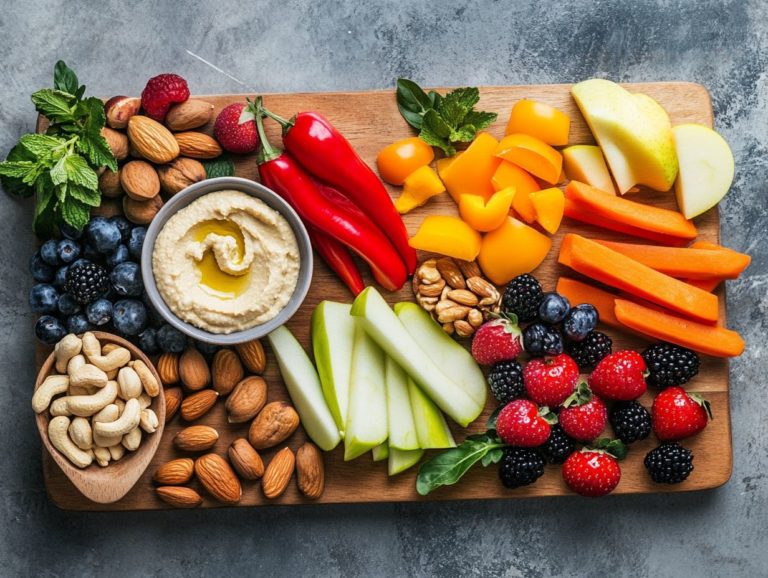What is Holistic Nutrition? A Comprehensive Guide
Holistic nutrition transcends the mere act of counting calories or chasing after the latest diet fad. It emphasizes a harmonious connection between your body, mind, and spirit, nurturing your overall well-being through nutrient-dense foods and mindful lifestyle choices.
This article delves into the principles of holistic nutrition, illustrating its important role in enhancing health and outlining the essential components of an effective nutrition plan. You ll discover practical tips for seamlessly integrating holistic practices into your daily routine, along with clarifications on common myths surrounding this approach.
Start your journey to a healthier, more balanced way of eating today!
Contents
Key Takeaways:

A holistic nutrition plan offers immediate benefits like improved digestion and increased energy! It takes into account the whole person – physical, mental, emotional, and spiritual – and emphasizes the importance of balance and harmony in achieving optimal health. However, it is not a substitute for medical treatment and may not work for everyone.
In addition to focusing on nutrient-dense foods and supplements, a holistic nutrition plan also considers the impact of emotions and mental well-being on overall health. It is important to address all aspects of wellness for optimal results.
What is Holistic Nutrition?
Understanding holistic nutrition is essential for crafting a personalized health plan that truly aligns with your individual needs. This approach emphasizes a balanced diet, rich in nutritional value, while reducing the intake of processed foods.
It beautifully integrates the idea of food as medicine, drawing inspiration from pioneers like Hippocrates and modern techniques such as Nutrition Response Testing, a method to assess how well your body is responding to various foods, championed by experts like Dr. Sergi in Brooklyn.
By prioritizing a healthy lifestyle, holistic nutrition not only fosters optimal body function but also enables you to make informed dietary choices that resonate with your well-being.
Why Holistic Nutrition Matters
Holistic nutrition is essential for fostering overall health and wellness, offering a wealth of benefits that transcend mere physical well-being.
The World Health Organization emphasizes that a holistic approach includes dietary guidelines that not only focus on nutritional intake but also encompass emotional and mental health. This comprehensive strategy effectively addresses concerns such as obesity, diabetes, heart disease, and even cancer.
However, it s important to acknowledge the potential challenges you may encounter, particularly regarding sugar and sodium consumption, which can hinder your path to enhanced health.
Key Components of a Holistic Nutrition Plan
A holistic nutrition plan is crafted around key elements. It emphasizes nutrient-dense foods, healthy fats, and sufficient hydration to optimize your body’s function and overall wellness.
Incorporating a diverse array of vegetables, fruits, and legumes is vital for supplying essential nutrients while fostering mindful eating practices and promoting portion control. These foods are packed with antioxidants, fiber, and phytonutrients, all of which support your immune health and digestive function, making them critical in your daily meals.
Considering supplements can help fill nutritional gaps and support your unique dietary goals.
Nutrient-Dense Foods and Supplements

Nutrient-dense foods are essential to your holistic nutrition plan, providing your body with the vital vitamins, minerals, and healthy fats needed for optimal functioning.
While whole foods should be the foundation of your dietary choices, you may find that supplements can effectively bridge any nutritional gaps, especially in your busy lifestyle. By strategically incorporating supplements alongside a balanced diet, you can enhance nutrient absorption and ensure your body receives the complete spectrum of essential elements for sustained energy and vitality.
Emotional and Mental Well-Being
The connection between holistic nutrition and your emotional and mental well-being is profound. The quality of your diet can significantly impact your mood and psychological health.
When you adopt a balanced approach to nutrition, you often find that your emotional resilience and cognitive clarity improve. This is especially important when considering the effects of sugar intake and highly processed foods. Both can lead to fluctuations in energy levels and mood swings.
By prioritizing whole foods rich in vitamins, minerals, and essential fatty acids, you can create a more stable emotional state. These dietary choices help regulate hormones and neurotransmitters, which are chemicals in the brain that affect your mood. They also play a vital role in reducing the risk of anxiety and depression.
This shows how closely our food choices affect our feelings an undeniable link that deserves your attention.
How to Incorporate Holistic Nutrition into Your Life
Incorporating holistic nutrition into your life requires practical tips and strategies. These will help you make healthier food choices and cultivate a nutritious lifestyle.
Start with mindful eating practices to enhance your awareness of your body’s hunger signals to help you control portions and minimize reliance on processed foods. When navigating the grocery store, prioritize whole, nutrient-dense options. Don t overlook the importance of hydration for your body s function and overall well-being.
Practical Tips and Strategies
Embracing holistic nutrition can enhance your overall well-being and pave the way for a healthier lifestyle. By weaving mindful eating practices into your daily routine, you can cultivate a deeper connection with your food. This allows you to savor each flavor and effectively recognize your hunger cues.
When you navigate grocery stores, focus on the perimeter of the aisles. This strategy often leads you to fresh produce and whole foods, helping you avoid processed items that may derail your nutritional goals.
Stay hydrated! It s essential for your energy and health. Carrying a reusable water bottle serves as a constant reminder to drink enough fluids throughout the day. Together, these actionable steps enable you to create a balanced and nourishing approach to your diet, fostering sustained health and vitality.
Myths and Misconceptions About Holistic Nutrition

Myths and misconceptions surrounding holistic nutrition often obscure its true value. This can cause many to miss out on the profound benefits it offers for achieving a balanced diet and a vibrant lifestyle.
One common myth is the belief that holistic nutrition is solely about weight loss. This narrow view overlooks its broader focus, which includes the nutritional value of foods and the significant effects of processed foods on overall health.
Debunking Common Misbeliefs
Debunking common misconceptions about holistic nutrition is crucial for cultivating a clearer understanding of its principles and benefits.
You might think holistic nutrition is just another passing fad focused on weight loss, but it offers a much broader view of health and wellness.
This approach emphasizes balanced diets filled with whole, nutrient-dense foods while actively avoiding highly processed items that can throw your body out of balance.
By highlighting the importance of nourishment from all food groups, holistic nutrition champions a sustainable lifestyle that nurtures both mind and body. This paves the way for long-term health rather than just quick fixes.
Final Thoughts and Recommendations
A comprehensive approach to nutrition boosts your physical health. It also nurtures your mental and emotional well-being.
Focusing on whole, nutrient-rich foods think colorful fruits, crisp vegetables, lean proteins, and hearty whole grains can elevate your energy and lower the risk of chronic diseases.
This method encourages mindfulness in your eating habits. You can truly connect with your food and appreciate the myriad benefits it provides for your body.
Focus on seasonal and locally sourced ingredients for lasting changes to deepen your connection to the earth.
Start with small, achievable goals! This sparks a sense of accomplishment and motivates your journey toward better eating.
In the end, prioritize nutrient-rich foods, practice mindful eating, and embrace a holistic view of health for enduring wellness.
Frequently Asked Questions
What is Holistic Nutrition?

Holistic Nutrition focuses on nourishing the body, mind, and spirit. It considers not only the food we eat but also our lifestyle, emotions, and environment.
How is Holistic Nutrition different from traditional nutrition?
Unlike traditional nutrition, which primarily counts calories and meets nutrient requirements, Holistic Nutrition takes an individualized approach. It recognizes that everyone has unique nutritional needs and factors that influence their health.
What does a Holistic Nutritionist do?
A Holistic Nutritionist helps individuals improve their overall health using a holistic approach. They develop personalized nutrition plans based on specific needs and goals.
What are the main principles of Holistic Nutrition?
The main principles include the belief that food is medicine, the importance of whole and natural foods, and the recognition that emotional and spiritual well-being affects physical health. It emphasizes balance and moderation in all aspects of life.
Can Holistic Nutrition help with specific health conditions?
Holistic Nutrition can benefit various health conditions by addressing root causes of imbalances in the body. It can assist with digestive issues, hormonal imbalances, chronic inflammation, and more. Always consult a qualified healthcare professional for specific health concerns.
How can I incorporate Holistic Nutrition into my daily life?
Incorporate Holistic Nutrition by making small changes to your eating habits. Choose whole and natural foods, cook at home more often, and be mindful of portion sizes. Pay attention to your emotional and spiritual well-being and make time for self-care activities like exercise, meditation, and adequate sleep.






